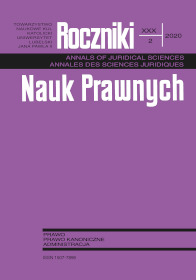Przestępstwo handlu niewolnikami (art. 8 p.w.k.k.)
Crime of Slave Trade (art. 8 p.i.c.c.)
Author(s): Adam WróbelSubject(s): Law, Constitution, Jurisprudence, Criminal Law
Published by: Towarzystwo Naukowe KUL & Katolicki Uniwersytet Lubelski Jana Pawła II
Keywords: slavery; slave trade; slave trade in Polish criminal law
Summary/Abstract: The subject of consideration is the crime of slave trade, specified in art. 8 of provisions introducing the criminal code (hereinafter: p.i.c.c.). The author considers the genesis of the provision of art. 8 p.i.c.c., subject of protection, object, subject side, object side of the slave trade crime; attempts to characterize, among others, the concepts of “slavery”, “slave trade”, “putting another person into a state of slavery”, “maintaining in state of slavery”, referring to the views expressed in doctrine and jurisprudence. The author points out, that the crime of art. 8 p.i.c.c. takes source from international agreements, of which the Republic of Poland is a party. The subject of protection of art. 8 p.i.c.c. is freedom and human dignity. The causative object is universal. The crime has many-varieties and intentional nature; it can be committed with the direct intention and also seems possible - possible intention; is a felony prosecuted by public accusation; may be committed by action, omission seems feasible in the case of the keeping a person in a state of slavery. The issue of slavery should be interpreted in the light of the legal definition, and slave trade in the context of the statutory definition of human trafficking. The slave trade can have even a one-time transaction nature – even free of charge – in relation to one person being its subject (what is sufficient to implement this crime).
Journal: Roczniki Nauk Prawnych
- Issue Year: 30/2020
- Issue No: 2
- Page Range: 133-151
- Page Count: 19
- Language: Polish

